Organisational Behaviour Report: John Lewis and Team Dynamics
VerifiedAdded on 2023/01/04
|15
|4598
|87
Report
AI Summary
This report provides an in-depth analysis of organisational behaviour, focusing on the influence of culture, power, and politics within an organisation. Using John Lewis as a case study, the report examines how these factors impact team and individual performance. It evaluates content and process theories of motivation, including Herzberg's two-factor theory and Vroom's expectancy theory, to assess their effectiveness in achieving organisational goals. The report also differentiates between effective and ineffective teams, exploring team development theories. Finally, it applies various concepts and philosophies of organisational behaviour to the given business context, offering insights into how these elements interact to shape organisational outcomes.
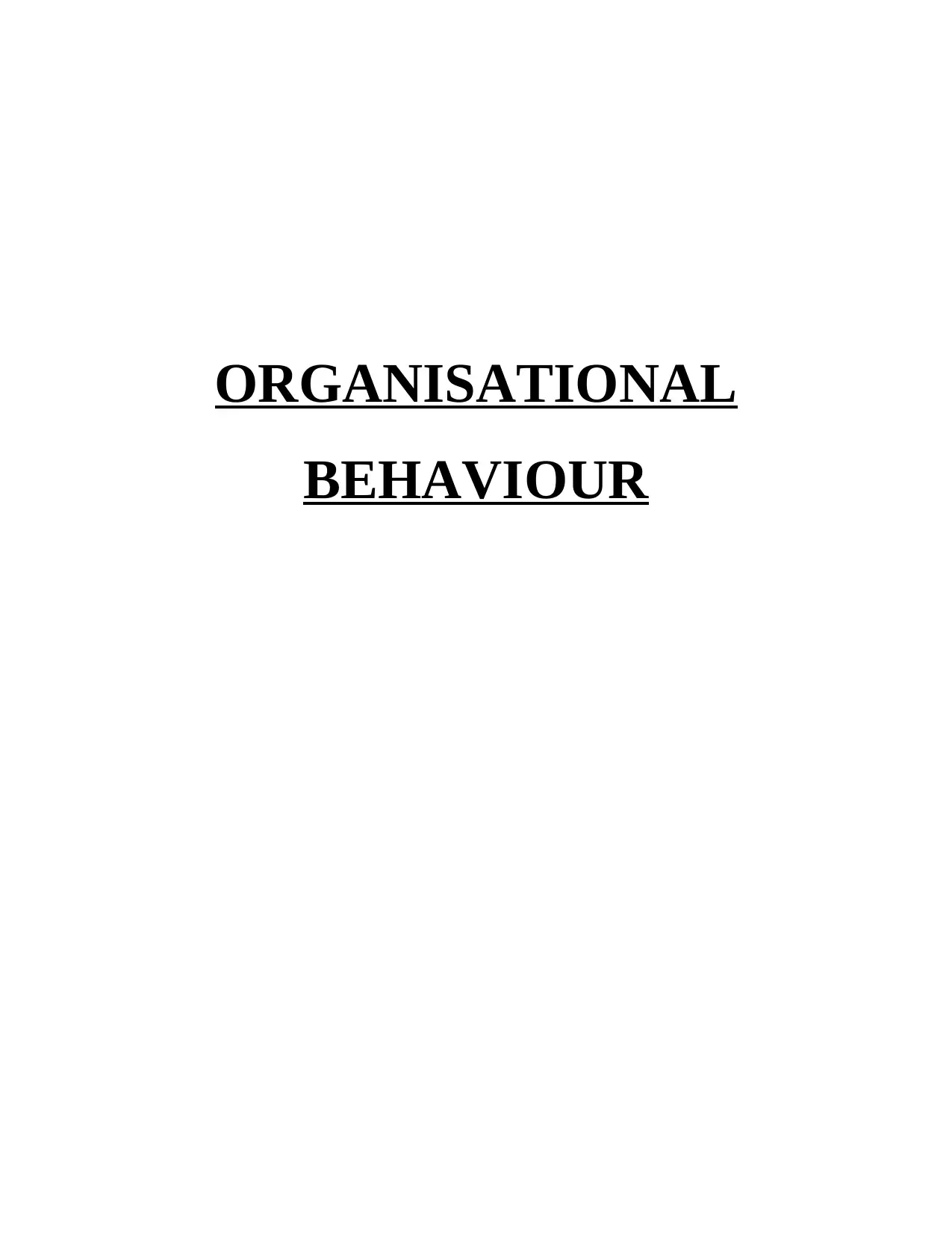
ORGANISATIONAL
BEHAVIOUR
BEHAVIOUR
Paraphrase This Document
Need a fresh take? Get an instant paraphrase of this document with our AI Paraphraser
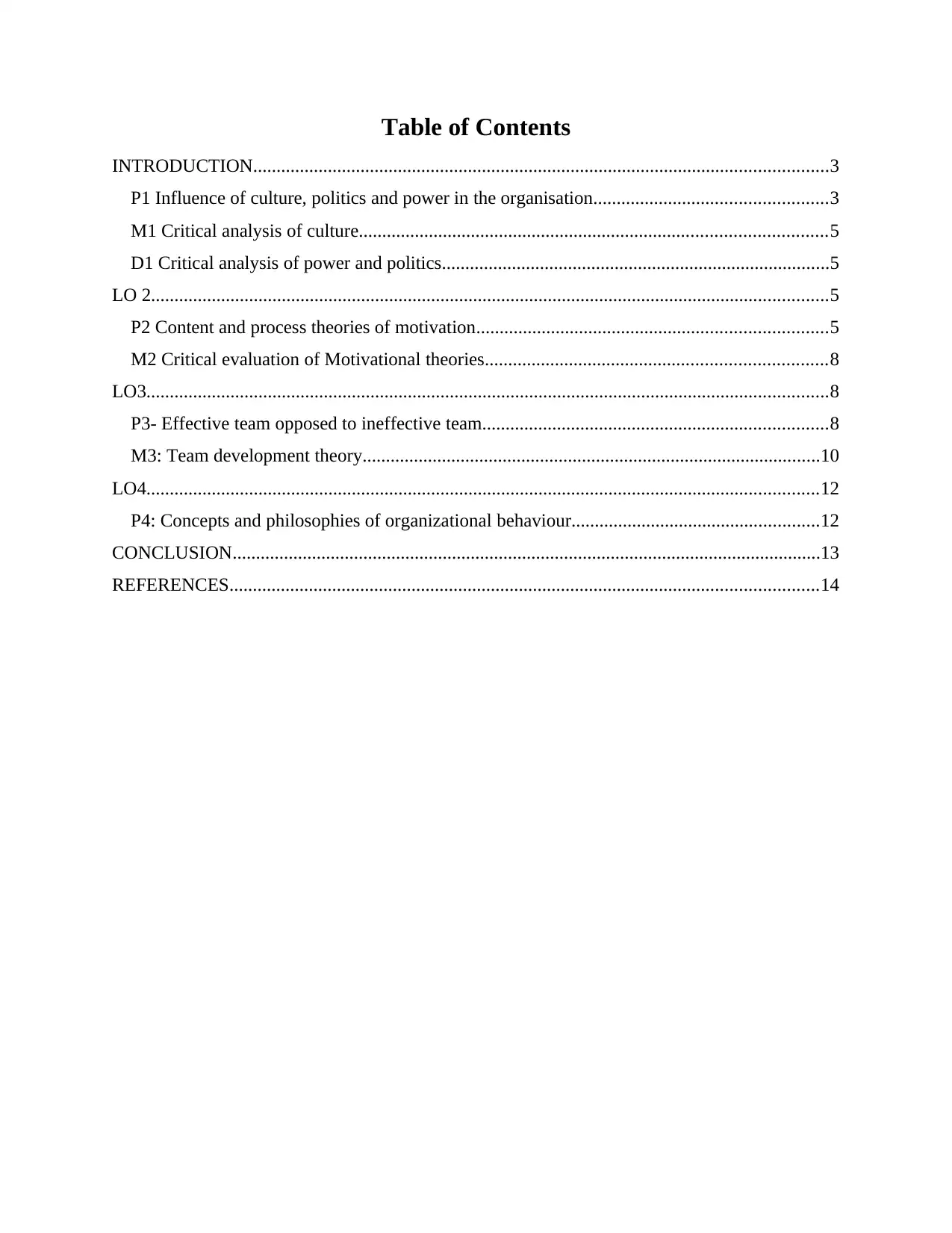
Table of Contents
INTRODUCTION...........................................................................................................................3
P1 Influence of culture, politics and power in the organisation..................................................3
M1 Critical analysis of culture....................................................................................................5
D1 Critical analysis of power and politics...................................................................................5
LO 2.................................................................................................................................................5
P2 Content and process theories of motivation...........................................................................5
M2 Critical evaluation of Motivational theories.........................................................................8
LO3..................................................................................................................................................8
P3- Effective team opposed to ineffective team..........................................................................8
M3: Team development theory..................................................................................................10
LO4................................................................................................................................................12
P4: Concepts and philosophies of organizational behaviour.....................................................12
CONCLUSION..............................................................................................................................13
REFERENCES..............................................................................................................................14
INTRODUCTION...........................................................................................................................3
P1 Influence of culture, politics and power in the organisation..................................................3
M1 Critical analysis of culture....................................................................................................5
D1 Critical analysis of power and politics...................................................................................5
LO 2.................................................................................................................................................5
P2 Content and process theories of motivation...........................................................................5
M2 Critical evaluation of Motivational theories.........................................................................8
LO3..................................................................................................................................................8
P3- Effective team opposed to ineffective team..........................................................................8
M3: Team development theory..................................................................................................10
LO4................................................................................................................................................12
P4: Concepts and philosophies of organizational behaviour.....................................................12
CONCLUSION..............................................................................................................................13
REFERENCES..............................................................................................................................14
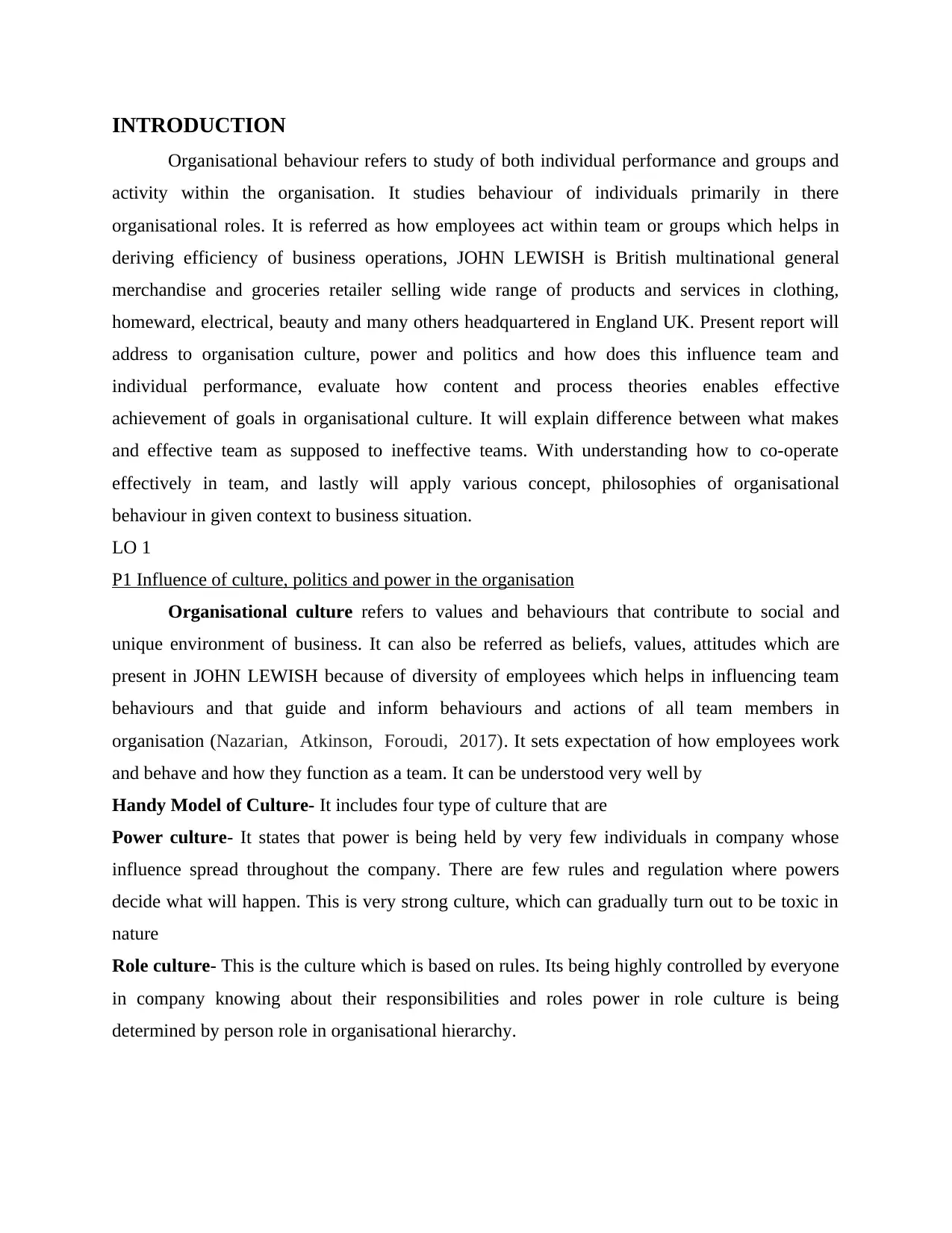
INTRODUCTION
Organisational behaviour refers to study of both individual performance and groups and
activity within the organisation. It studies behaviour of individuals primarily in there
organisational roles. It is referred as how employees act within team or groups which helps in
deriving efficiency of business operations, JOHN LEWISH is British multinational general
merchandise and groceries retailer selling wide range of products and services in clothing,
homeward, electrical, beauty and many others headquartered in England UK. Present report will
address to organisation culture, power and politics and how does this influence team and
individual performance, evaluate how content and process theories enables effective
achievement of goals in organisational culture. It will explain difference between what makes
and effective team as supposed to ineffective teams. With understanding how to co-operate
effectively in team, and lastly will apply various concept, philosophies of organisational
behaviour in given context to business situation.
LO 1
P1 Influence of culture, politics and power in the organisation
Organisational culture refers to values and behaviours that contribute to social and
unique environment of business. It can also be referred as beliefs, values, attitudes which are
present in JOHN LEWISH because of diversity of employees which helps in influencing team
behaviours and that guide and inform behaviours and actions of all team members in
organisation (Nazarian, Atkinson, Foroudi, 2017). It sets expectation of how employees work
and behave and how they function as a team. It can be understood very well by
Handy Model of Culture- It includes four type of culture that are
Power culture- It states that power is being held by very few individuals in company whose
influence spread throughout the company. There are few rules and regulation where powers
decide what will happen. This is very strong culture, which can gradually turn out to be toxic in
nature
Role culture- This is the culture which is based on rules. Its being highly controlled by everyone
in company knowing about their responsibilities and roles power in role culture is being
determined by person role in organisational hierarchy.
Organisational behaviour refers to study of both individual performance and groups and
activity within the organisation. It studies behaviour of individuals primarily in there
organisational roles. It is referred as how employees act within team or groups which helps in
deriving efficiency of business operations, JOHN LEWISH is British multinational general
merchandise and groceries retailer selling wide range of products and services in clothing,
homeward, electrical, beauty and many others headquartered in England UK. Present report will
address to organisation culture, power and politics and how does this influence team and
individual performance, evaluate how content and process theories enables effective
achievement of goals in organisational culture. It will explain difference between what makes
and effective team as supposed to ineffective teams. With understanding how to co-operate
effectively in team, and lastly will apply various concept, philosophies of organisational
behaviour in given context to business situation.
LO 1
P1 Influence of culture, politics and power in the organisation
Organisational culture refers to values and behaviours that contribute to social and
unique environment of business. It can also be referred as beliefs, values, attitudes which are
present in JOHN LEWISH because of diversity of employees which helps in influencing team
behaviours and that guide and inform behaviours and actions of all team members in
organisation (Nazarian, Atkinson, Foroudi, 2017). It sets expectation of how employees work
and behave and how they function as a team. It can be understood very well by
Handy Model of Culture- It includes four type of culture that are
Power culture- It states that power is being held by very few individuals in company whose
influence spread throughout the company. There are few rules and regulation where powers
decide what will happen. This is very strong culture, which can gradually turn out to be toxic in
nature
Role culture- This is the culture which is based on rules. Its being highly controlled by everyone
in company knowing about their responsibilities and roles power in role culture is being
determined by person role in organisational hierarchy.
⊘ This is a preview!⊘
Do you want full access?
Subscribe today to unlock all pages.

Trusted by 1+ million students worldwide
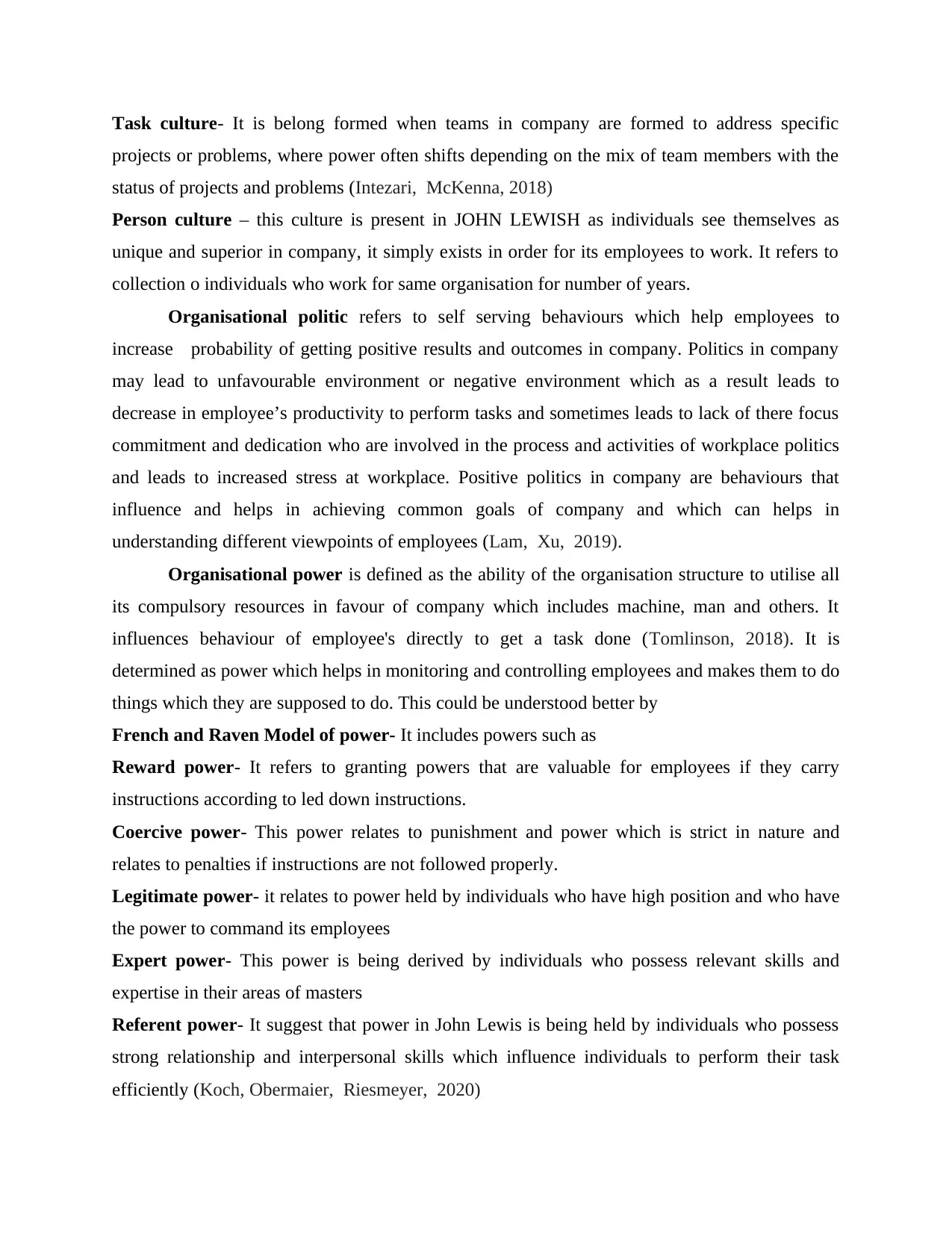
Task culture- It is belong formed when teams in company are formed to address specific
projects or problems, where power often shifts depending on the mix of team members with the
status of projects and problems (Intezari, McKenna, 2018)
Person culture – this culture is present in JOHN LEWISH as individuals see themselves as
unique and superior in company, it simply exists in order for its employees to work. It refers to
collection o individuals who work for same organisation for number of years.
Organisational politic refers to self serving behaviours which help employees to
increase probability of getting positive results and outcomes in company. Politics in company
may lead to unfavourable environment or negative environment which as a result leads to
decrease in employee’s productivity to perform tasks and sometimes leads to lack of there focus
commitment and dedication who are involved in the process and activities of workplace politics
and leads to increased stress at workplace. Positive politics in company are behaviours that
influence and helps in achieving common goals of company and which can helps in
understanding different viewpoints of employees (Lam, Xu, 2019).
Organisational power is defined as the ability of the organisation structure to utilise all
its compulsory resources in favour of company which includes machine, man and others. It
influences behaviour of employee's directly to get a task done (Tomlinson, 2018). It is
determined as power which helps in monitoring and controlling employees and makes them to do
things which they are supposed to do. This could be understood better by
French and Raven Model of power- It includes powers such as
Reward power- It refers to granting powers that are valuable for employees if they carry
instructions according to led down instructions.
Coercive power- This power relates to punishment and power which is strict in nature and
relates to penalties if instructions are not followed properly.
Legitimate power- it relates to power held by individuals who have high position and who have
the power to command its employees
Expert power- This power is being derived by individuals who possess relevant skills and
expertise in their areas of masters
Referent power- It suggest that power in John Lewis is being held by individuals who possess
strong relationship and interpersonal skills which influence individuals to perform their task
efficiently (Koch, Obermaier, Riesmeyer, 2020)
projects or problems, where power often shifts depending on the mix of team members with the
status of projects and problems (Intezari, McKenna, 2018)
Person culture – this culture is present in JOHN LEWISH as individuals see themselves as
unique and superior in company, it simply exists in order for its employees to work. It refers to
collection o individuals who work for same organisation for number of years.
Organisational politic refers to self serving behaviours which help employees to
increase probability of getting positive results and outcomes in company. Politics in company
may lead to unfavourable environment or negative environment which as a result leads to
decrease in employee’s productivity to perform tasks and sometimes leads to lack of there focus
commitment and dedication who are involved in the process and activities of workplace politics
and leads to increased stress at workplace. Positive politics in company are behaviours that
influence and helps in achieving common goals of company and which can helps in
understanding different viewpoints of employees (Lam, Xu, 2019).
Organisational power is defined as the ability of the organisation structure to utilise all
its compulsory resources in favour of company which includes machine, man and others. It
influences behaviour of employee's directly to get a task done (Tomlinson, 2018). It is
determined as power which helps in monitoring and controlling employees and makes them to do
things which they are supposed to do. This could be understood better by
French and Raven Model of power- It includes powers such as
Reward power- It refers to granting powers that are valuable for employees if they carry
instructions according to led down instructions.
Coercive power- This power relates to punishment and power which is strict in nature and
relates to penalties if instructions are not followed properly.
Legitimate power- it relates to power held by individuals who have high position and who have
the power to command its employees
Expert power- This power is being derived by individuals who possess relevant skills and
expertise in their areas of masters
Referent power- It suggest that power in John Lewis is being held by individuals who possess
strong relationship and interpersonal skills which influence individuals to perform their task
efficiently (Koch, Obermaier, Riesmeyer, 2020)
Paraphrase This Document
Need a fresh take? Get an instant paraphrase of this document with our AI Paraphraser
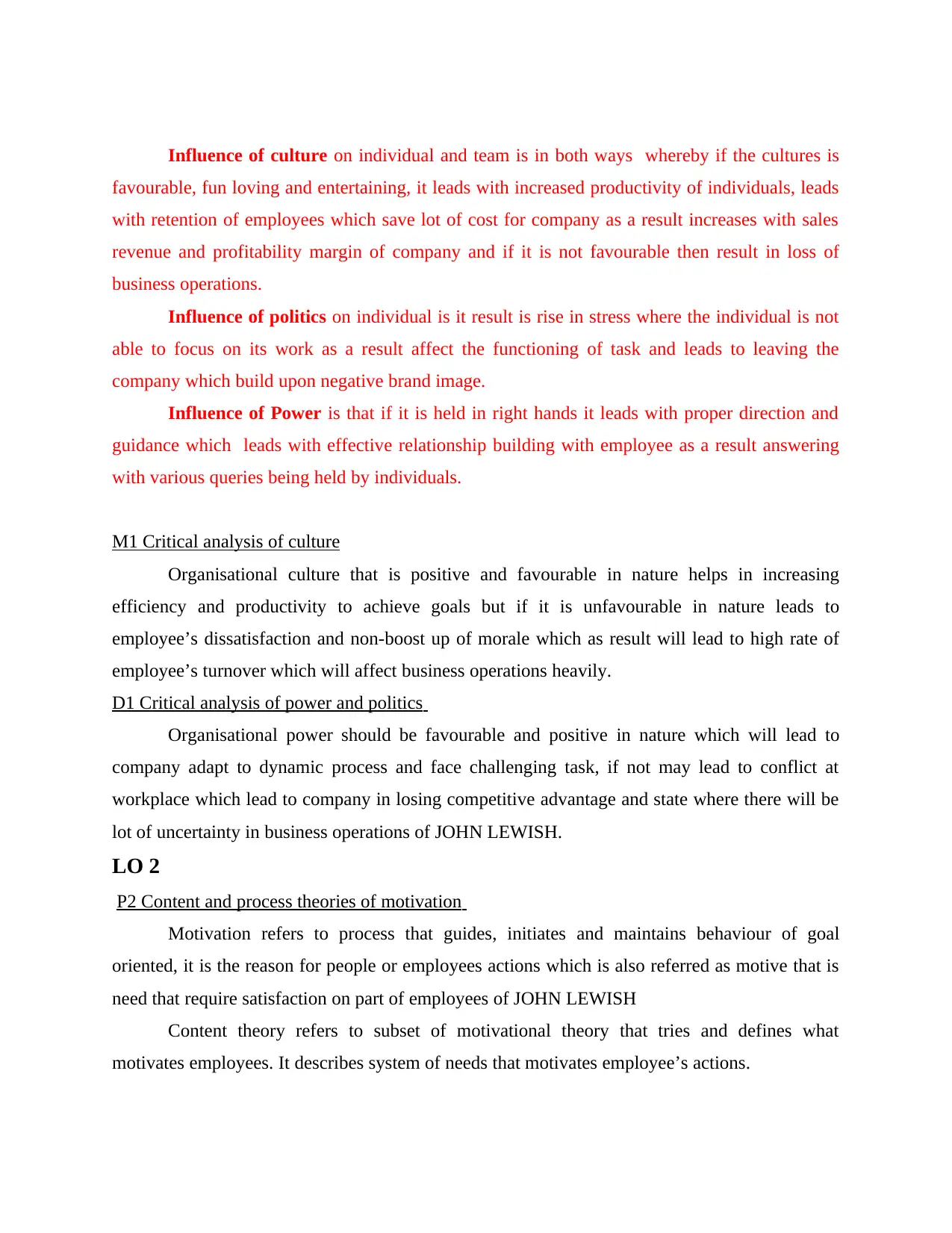
Influence of culture on individual and team is in both ways whereby if the cultures is
favourable, fun loving and entertaining, it leads with increased productivity of individuals, leads
with retention of employees which save lot of cost for company as a result increases with sales
revenue and profitability margin of company and if it is not favourable then result in loss of
business operations.
Influence of politics on individual is it result is rise in stress where the individual is not
able to focus on its work as a result affect the functioning of task and leads to leaving the
company which build upon negative brand image.
Influence of Power is that if it is held in right hands it leads with proper direction and
guidance which leads with effective relationship building with employee as a result answering
with various queries being held by individuals.
M1 Critical analysis of culture
Organisational culture that is positive and favourable in nature helps in increasing
efficiency and productivity to achieve goals but if it is unfavourable in nature leads to
employee’s dissatisfaction and non-boost up of morale which as result will lead to high rate of
employee’s turnover which will affect business operations heavily.
D1 Critical analysis of power and politics
Organisational power should be favourable and positive in nature which will lead to
company adapt to dynamic process and face challenging task, if not may lead to conflict at
workplace which lead to company in losing competitive advantage and state where there will be
lot of uncertainty in business operations of JOHN LEWISH.
LO 2
P2 Content and process theories of motivation
Motivation refers to process that guides, initiates and maintains behaviour of goal
oriented, it is the reason for people or employees actions which is also referred as motive that is
need that require satisfaction on part of employees of JOHN LEWISH
Content theory refers to subset of motivational theory that tries and defines what
motivates employees. It describes system of needs that motivates employee’s actions.
favourable, fun loving and entertaining, it leads with increased productivity of individuals, leads
with retention of employees which save lot of cost for company as a result increases with sales
revenue and profitability margin of company and if it is not favourable then result in loss of
business operations.
Influence of politics on individual is it result is rise in stress where the individual is not
able to focus on its work as a result affect the functioning of task and leads to leaving the
company which build upon negative brand image.
Influence of Power is that if it is held in right hands it leads with proper direction and
guidance which leads with effective relationship building with employee as a result answering
with various queries being held by individuals.
M1 Critical analysis of culture
Organisational culture that is positive and favourable in nature helps in increasing
efficiency and productivity to achieve goals but if it is unfavourable in nature leads to
employee’s dissatisfaction and non-boost up of morale which as result will lead to high rate of
employee’s turnover which will affect business operations heavily.
D1 Critical analysis of power and politics
Organisational power should be favourable and positive in nature which will lead to
company adapt to dynamic process and face challenging task, if not may lead to conflict at
workplace which lead to company in losing competitive advantage and state where there will be
lot of uncertainty in business operations of JOHN LEWISH.
LO 2
P2 Content and process theories of motivation
Motivation refers to process that guides, initiates and maintains behaviour of goal
oriented, it is the reason for people or employees actions which is also referred as motive that is
need that require satisfaction on part of employees of JOHN LEWISH
Content theory refers to subset of motivational theory that tries and defines what
motivates employees. It describes system of needs that motivates employee’s actions.
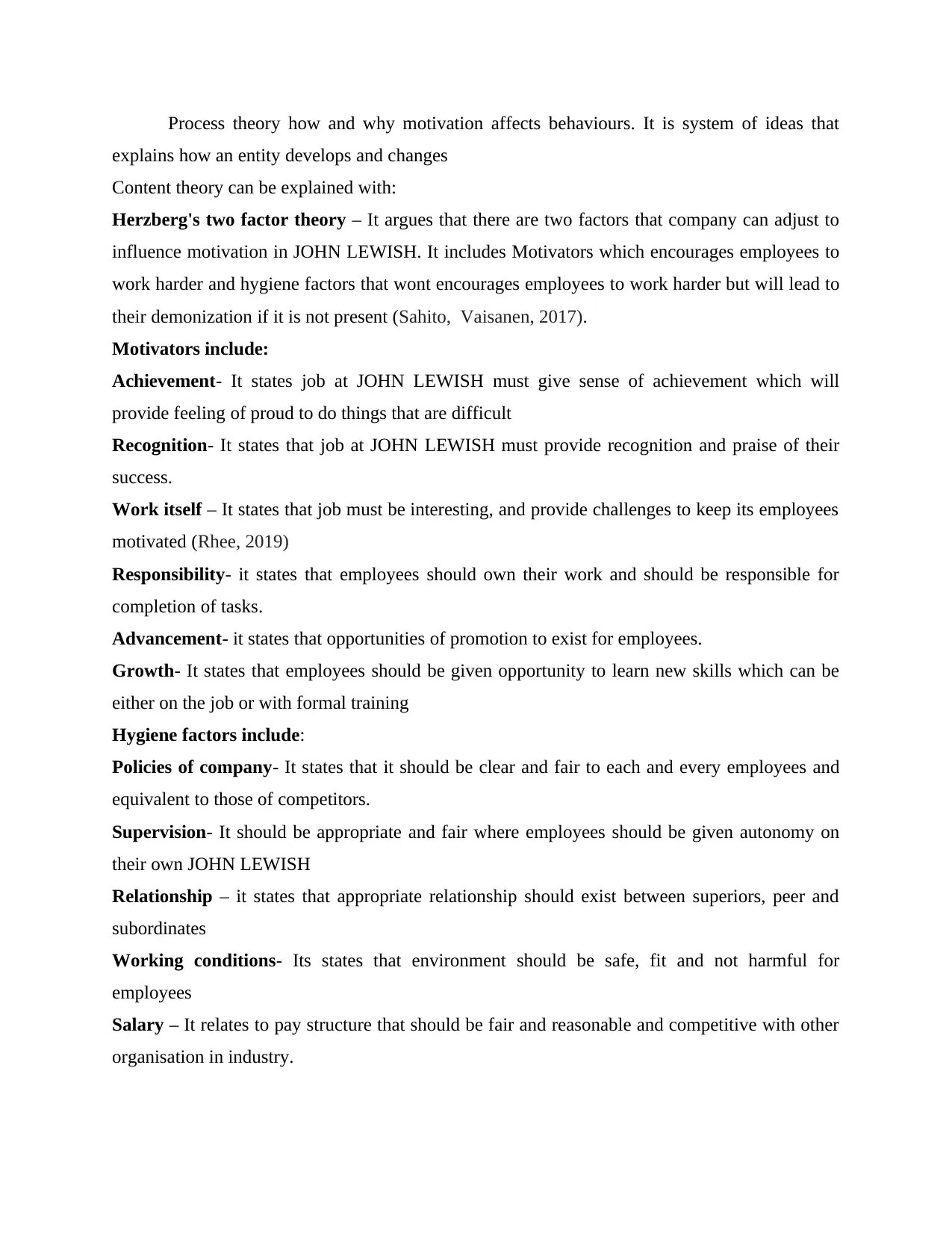
Process theory how and why motivation affects behaviours. It is system of ideas that
explains how an entity develops and changes
Content theory can be explained with:
Herzberg's two factor theory – It argues that there are two factors that company can adjust to
influence motivation in JOHN LEWISH. It includes Motivators which encourages employees to
work harder and hygiene factors that wont encourages employees to work harder but will lead to
their demonization if it is not present (Sahito, Vaisanen, 2017).
Motivators include:
Achievement- It states job at JOHN LEWISH must give sense of achievement which will
provide feeling of proud to do things that are difficult
Recognition- It states that job at JOHN LEWISH must provide recognition and praise of their
success.
Work itself – It states that job must be interesting, and provide challenges to keep its employees
motivated (Rhee, 2019)
Responsibility- it states that employees should own their work and should be responsible for
completion of tasks.
Advancement- it states that opportunities of promotion to exist for employees.
Growth- It states that employees should be given opportunity to learn new skills which can be
either on the job or with formal training
Hygiene factors include:
Policies of company- It states that it should be clear and fair to each and every employees and
equivalent to those of competitors.
Supervision- It should be appropriate and fair where employees should be given autonomy on
their own JOHN LEWISH
Relationship – it states that appropriate relationship should exist between superiors, peer and
subordinates
Working conditions- Its states that environment should be safe, fit and not harmful for
employees
Salary – It relates to pay structure that should be fair and reasonable and competitive with other
organisation in industry.
explains how an entity develops and changes
Content theory can be explained with:
Herzberg's two factor theory – It argues that there are two factors that company can adjust to
influence motivation in JOHN LEWISH. It includes Motivators which encourages employees to
work harder and hygiene factors that wont encourages employees to work harder but will lead to
their demonization if it is not present (Sahito, Vaisanen, 2017).
Motivators include:
Achievement- It states job at JOHN LEWISH must give sense of achievement which will
provide feeling of proud to do things that are difficult
Recognition- It states that job at JOHN LEWISH must provide recognition and praise of their
success.
Work itself – It states that job must be interesting, and provide challenges to keep its employees
motivated (Rhee, 2019)
Responsibility- it states that employees should own their work and should be responsible for
completion of tasks.
Advancement- it states that opportunities of promotion to exist for employees.
Growth- It states that employees should be given opportunity to learn new skills which can be
either on the job or with formal training
Hygiene factors include:
Policies of company- It states that it should be clear and fair to each and every employees and
equivalent to those of competitors.
Supervision- It should be appropriate and fair where employees should be given autonomy on
their own JOHN LEWISH
Relationship – it states that appropriate relationship should exist between superiors, peer and
subordinates
Working conditions- Its states that environment should be safe, fit and not harmful for
employees
Salary – It relates to pay structure that should be fair and reasonable and competitive with other
organisation in industry.
⊘ This is a preview!⊘
Do you want full access?
Subscribe today to unlock all pages.

Trusted by 1+ million students worldwide
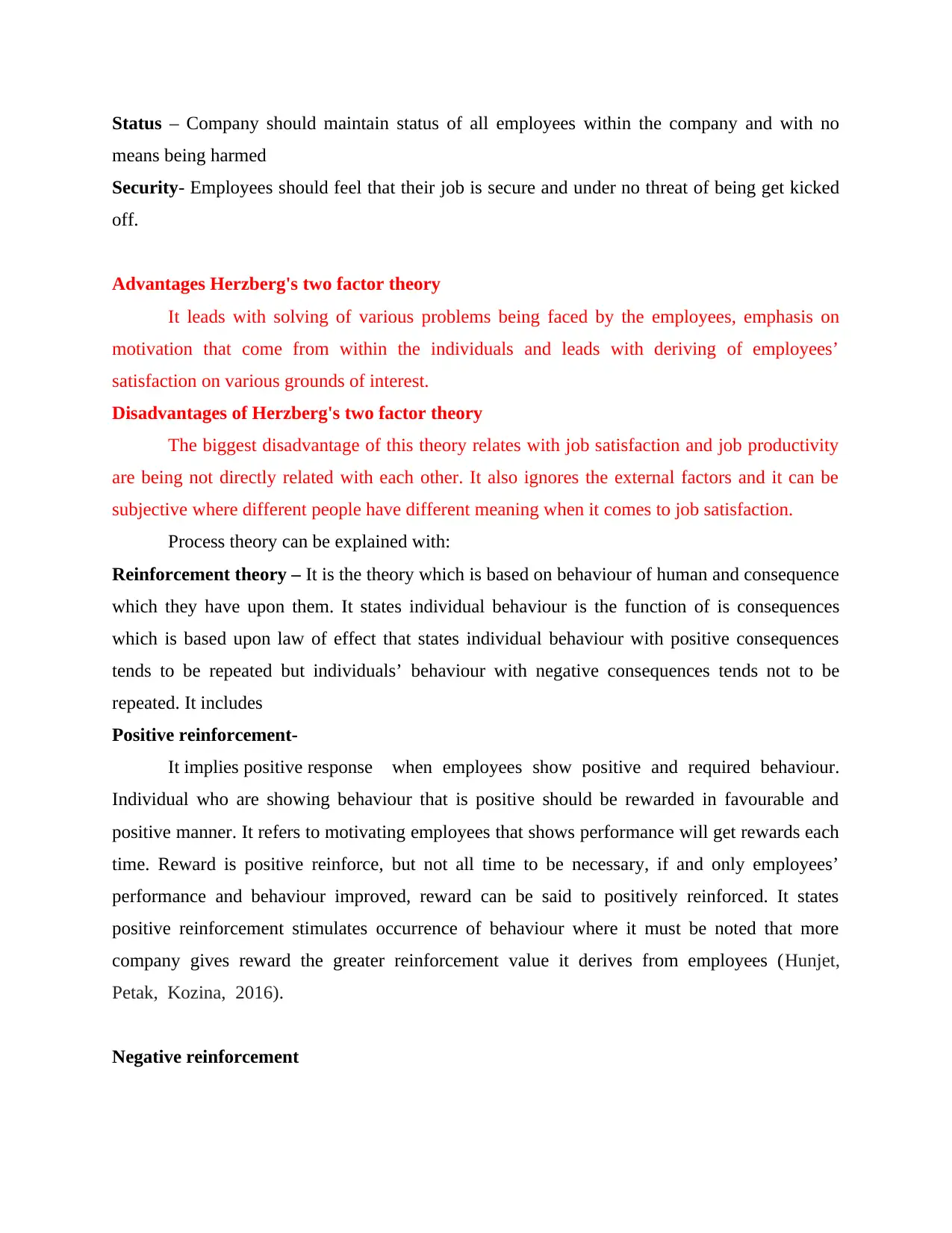
Status – Company should maintain status of all employees within the company and with no
means being harmed
Security- Employees should feel that their job is secure and under no threat of being get kicked
off.
Advantages Herzberg's two factor theory
It leads with solving of various problems being faced by the employees, emphasis on
motivation that come from within the individuals and leads with deriving of employees’
satisfaction on various grounds of interest.
Disadvantages of Herzberg's two factor theory
The biggest disadvantage of this theory relates with job satisfaction and job productivity
are being not directly related with each other. It also ignores the external factors and it can be
subjective where different people have different meaning when it comes to job satisfaction.
Process theory can be explained with:
Reinforcement theory – It is the theory which is based on behaviour of human and consequence
which they have upon them. It states individual behaviour is the function of is consequences
which is based upon law of effect that states individual behaviour with positive consequences
tends to be repeated but individuals’ behaviour with negative consequences tends not to be
repeated. It includes
Positive reinforcement-
It implies positive response when employees show positive and required behaviour.
Individual who are showing behaviour that is positive should be rewarded in favourable and
positive manner. It refers to motivating employees that shows performance will get rewards each
time. Reward is positive reinforce, but not all time to be necessary, if and only employees’
performance and behaviour improved, reward can be said to positively reinforced. It states
positive reinforcement stimulates occurrence of behaviour where it must be noted that more
company gives reward the greater reinforcement value it derives from employees (Hunjet,
Petak, Kozina, 2016).
Negative reinforcement
means being harmed
Security- Employees should feel that their job is secure and under no threat of being get kicked
off.
Advantages Herzberg's two factor theory
It leads with solving of various problems being faced by the employees, emphasis on
motivation that come from within the individuals and leads with deriving of employees’
satisfaction on various grounds of interest.
Disadvantages of Herzberg's two factor theory
The biggest disadvantage of this theory relates with job satisfaction and job productivity
are being not directly related with each other. It also ignores the external factors and it can be
subjective where different people have different meaning when it comes to job satisfaction.
Process theory can be explained with:
Reinforcement theory – It is the theory which is based on behaviour of human and consequence
which they have upon them. It states individual behaviour is the function of is consequences
which is based upon law of effect that states individual behaviour with positive consequences
tends to be repeated but individuals’ behaviour with negative consequences tends not to be
repeated. It includes
Positive reinforcement-
It implies positive response when employees show positive and required behaviour.
Individual who are showing behaviour that is positive should be rewarded in favourable and
positive manner. It refers to motivating employees that shows performance will get rewards each
time. Reward is positive reinforce, but not all time to be necessary, if and only employees’
performance and behaviour improved, reward can be said to positively reinforced. It states
positive reinforcement stimulates occurrence of behaviour where it must be noted that more
company gives reward the greater reinforcement value it derives from employees (Hunjet,
Petak, Kozina, 2016).
Negative reinforcement
Paraphrase This Document
Need a fresh take? Get an instant paraphrase of this document with our AI Paraphraser
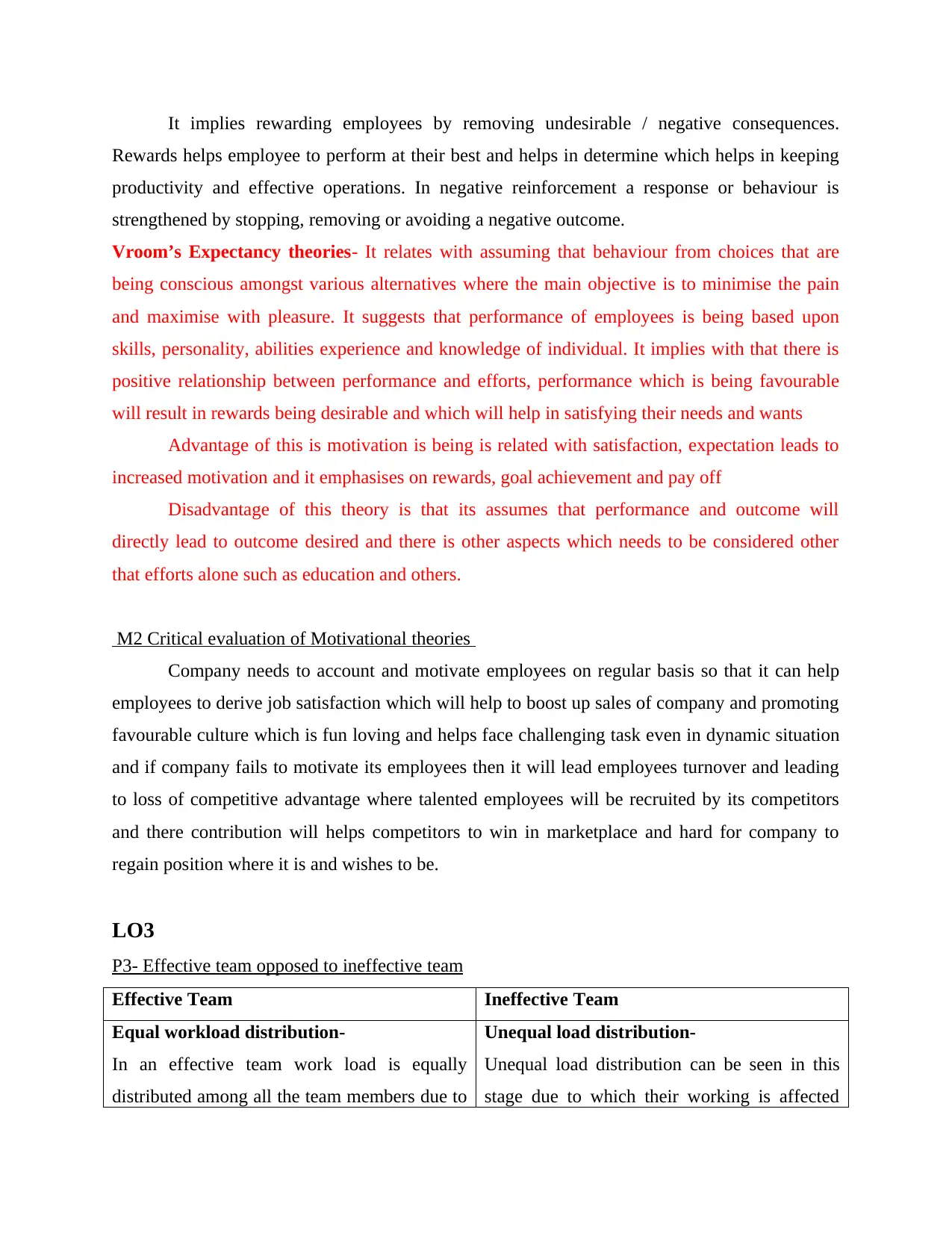
It implies rewarding employees by removing undesirable / negative consequences.
Rewards helps employee to perform at their best and helps in determine which helps in keeping
productivity and effective operations. In negative reinforcement a response or behaviour is
strengthened by stopping, removing or avoiding a negative outcome.
Vroom’s Expectancy theories- It relates with assuming that behaviour from choices that are
being conscious amongst various alternatives where the main objective is to minimise the pain
and maximise with pleasure. It suggests that performance of employees is being based upon
skills, personality, abilities experience and knowledge of individual. It implies with that there is
positive relationship between performance and efforts, performance which is being favourable
will result in rewards being desirable and which will help in satisfying their needs and wants
Advantage of this is motivation is being is related with satisfaction, expectation leads to
increased motivation and it emphasises on rewards, goal achievement and pay off
Disadvantage of this theory is that its assumes that performance and outcome will
directly lead to outcome desired and there is other aspects which needs to be considered other
that efforts alone such as education and others.
M2 Critical evaluation of Motivational theories
Company needs to account and motivate employees on regular basis so that it can help
employees to derive job satisfaction which will help to boost up sales of company and promoting
favourable culture which is fun loving and helps face challenging task even in dynamic situation
and if company fails to motivate its employees then it will lead employees turnover and leading
to loss of competitive advantage where talented employees will be recruited by its competitors
and there contribution will helps competitors to win in marketplace and hard for company to
regain position where it is and wishes to be.
LO3
P3- Effective team opposed to ineffective team
Effective Team Ineffective Team
Equal workload distribution-
In an effective team work load is equally
distributed among all the team members due to
Unequal load distribution-
Unequal load distribution can be seen in this
stage due to which their working is affected
Rewards helps employee to perform at their best and helps in determine which helps in keeping
productivity and effective operations. In negative reinforcement a response or behaviour is
strengthened by stopping, removing or avoiding a negative outcome.
Vroom’s Expectancy theories- It relates with assuming that behaviour from choices that are
being conscious amongst various alternatives where the main objective is to minimise the pain
and maximise with pleasure. It suggests that performance of employees is being based upon
skills, personality, abilities experience and knowledge of individual. It implies with that there is
positive relationship between performance and efforts, performance which is being favourable
will result in rewards being desirable and which will help in satisfying their needs and wants
Advantage of this is motivation is being is related with satisfaction, expectation leads to
increased motivation and it emphasises on rewards, goal achievement and pay off
Disadvantage of this theory is that its assumes that performance and outcome will
directly lead to outcome desired and there is other aspects which needs to be considered other
that efforts alone such as education and others.
M2 Critical evaluation of Motivational theories
Company needs to account and motivate employees on regular basis so that it can help
employees to derive job satisfaction which will help to boost up sales of company and promoting
favourable culture which is fun loving and helps face challenging task even in dynamic situation
and if company fails to motivate its employees then it will lead employees turnover and leading
to loss of competitive advantage where talented employees will be recruited by its competitors
and there contribution will helps competitors to win in marketplace and hard for company to
regain position where it is and wishes to be.
LO3
P3- Effective team opposed to ineffective team
Effective Team Ineffective Team
Equal workload distribution-
In an effective team work load is equally
distributed among all the team members due to
Unequal load distribution-
Unequal load distribution can be seen in this
stage due to which their working is affected
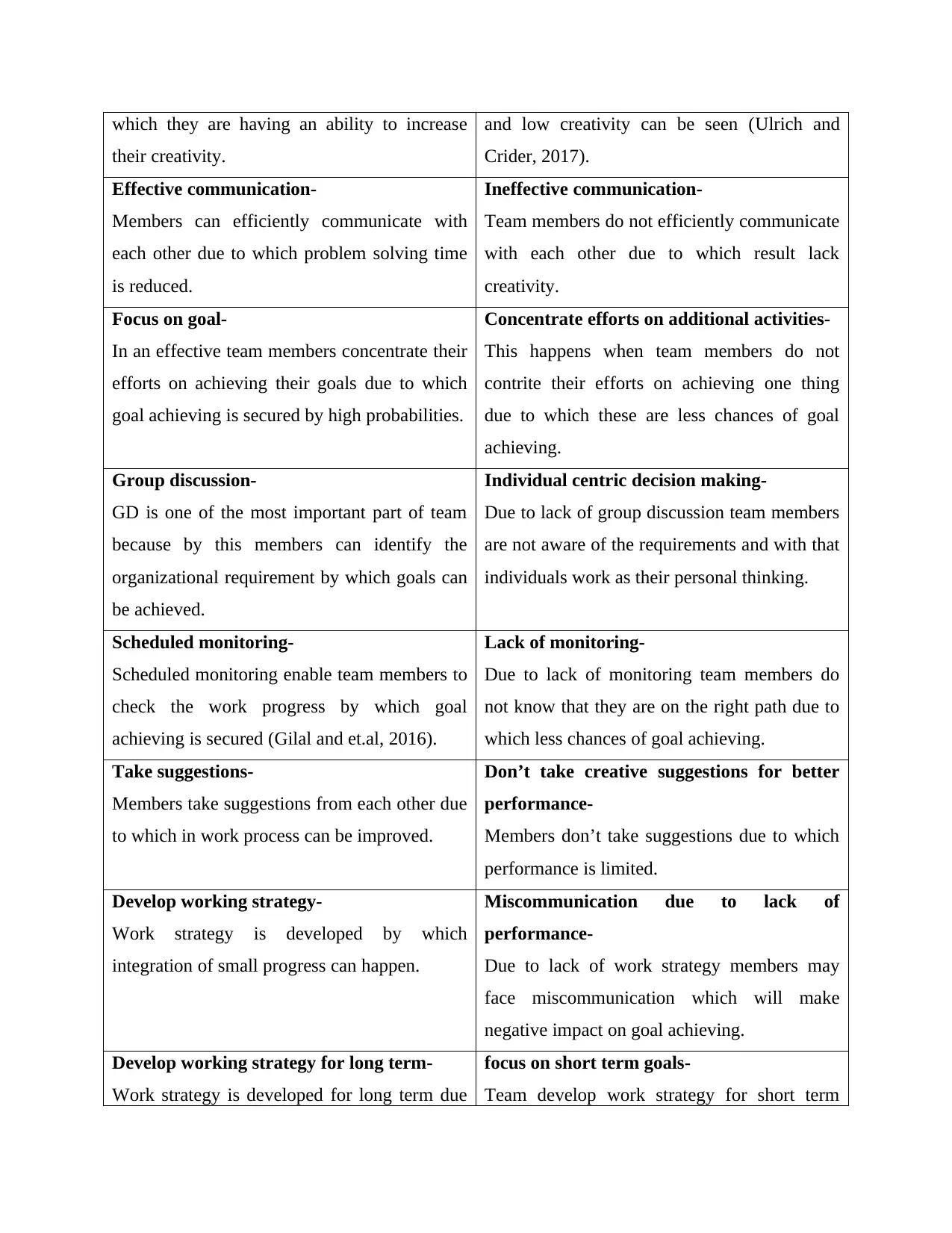
which they are having an ability to increase
their creativity.
and low creativity can be seen (Ulrich and
Crider, 2017).
Effective communication-
Members can efficiently communicate with
each other due to which problem solving time
is reduced.
Ineffective communication-
Team members do not efficiently communicate
with each other due to which result lack
creativity.
Focus on goal-
In an effective team members concentrate their
efforts on achieving their goals due to which
goal achieving is secured by high probabilities.
Concentrate efforts on additional activities-
This happens when team members do not
contrite their efforts on achieving one thing
due to which these are less chances of goal
achieving.
Group discussion-
GD is one of the most important part of team
because by this members can identify the
organizational requirement by which goals can
be achieved.
Individual centric decision making-
Due to lack of group discussion team members
are not aware of the requirements and with that
individuals work as their personal thinking.
Scheduled monitoring-
Scheduled monitoring enable team members to
check the work progress by which goal
achieving is secured (Gilal and et.al, 2016).
Lack of monitoring-
Due to lack of monitoring team members do
not know that they are on the right path due to
which less chances of goal achieving.
Take suggestions-
Members take suggestions from each other due
to which in work process can be improved.
Don’t take creative suggestions for better
performance-
Members don’t take suggestions due to which
performance is limited.
Develop working strategy-
Work strategy is developed by which
integration of small progress can happen.
Miscommunication due to lack of
performance-
Due to lack of work strategy members may
face miscommunication which will make
negative impact on goal achieving.
Develop working strategy for long term-
Work strategy is developed for long term due
focus on short term goals-
Team develop work strategy for short term
their creativity.
and low creativity can be seen (Ulrich and
Crider, 2017).
Effective communication-
Members can efficiently communicate with
each other due to which problem solving time
is reduced.
Ineffective communication-
Team members do not efficiently communicate
with each other due to which result lack
creativity.
Focus on goal-
In an effective team members concentrate their
efforts on achieving their goals due to which
goal achieving is secured by high probabilities.
Concentrate efforts on additional activities-
This happens when team members do not
contrite their efforts on achieving one thing
due to which these are less chances of goal
achieving.
Group discussion-
GD is one of the most important part of team
because by this members can identify the
organizational requirement by which goals can
be achieved.
Individual centric decision making-
Due to lack of group discussion team members
are not aware of the requirements and with that
individuals work as their personal thinking.
Scheduled monitoring-
Scheduled monitoring enable team members to
check the work progress by which goal
achieving is secured (Gilal and et.al, 2016).
Lack of monitoring-
Due to lack of monitoring team members do
not know that they are on the right path due to
which less chances of goal achieving.
Take suggestions-
Members take suggestions from each other due
to which in work process can be improved.
Don’t take creative suggestions for better
performance-
Members don’t take suggestions due to which
performance is limited.
Develop working strategy-
Work strategy is developed by which
integration of small progress can happen.
Miscommunication due to lack of
performance-
Due to lack of work strategy members may
face miscommunication which will make
negative impact on goal achieving.
Develop working strategy for long term-
Work strategy is developed for long term due
focus on short term goals-
Team develop work strategy for short term
⊘ This is a preview!⊘
Do you want full access?
Subscribe today to unlock all pages.

Trusted by 1+ million students worldwide
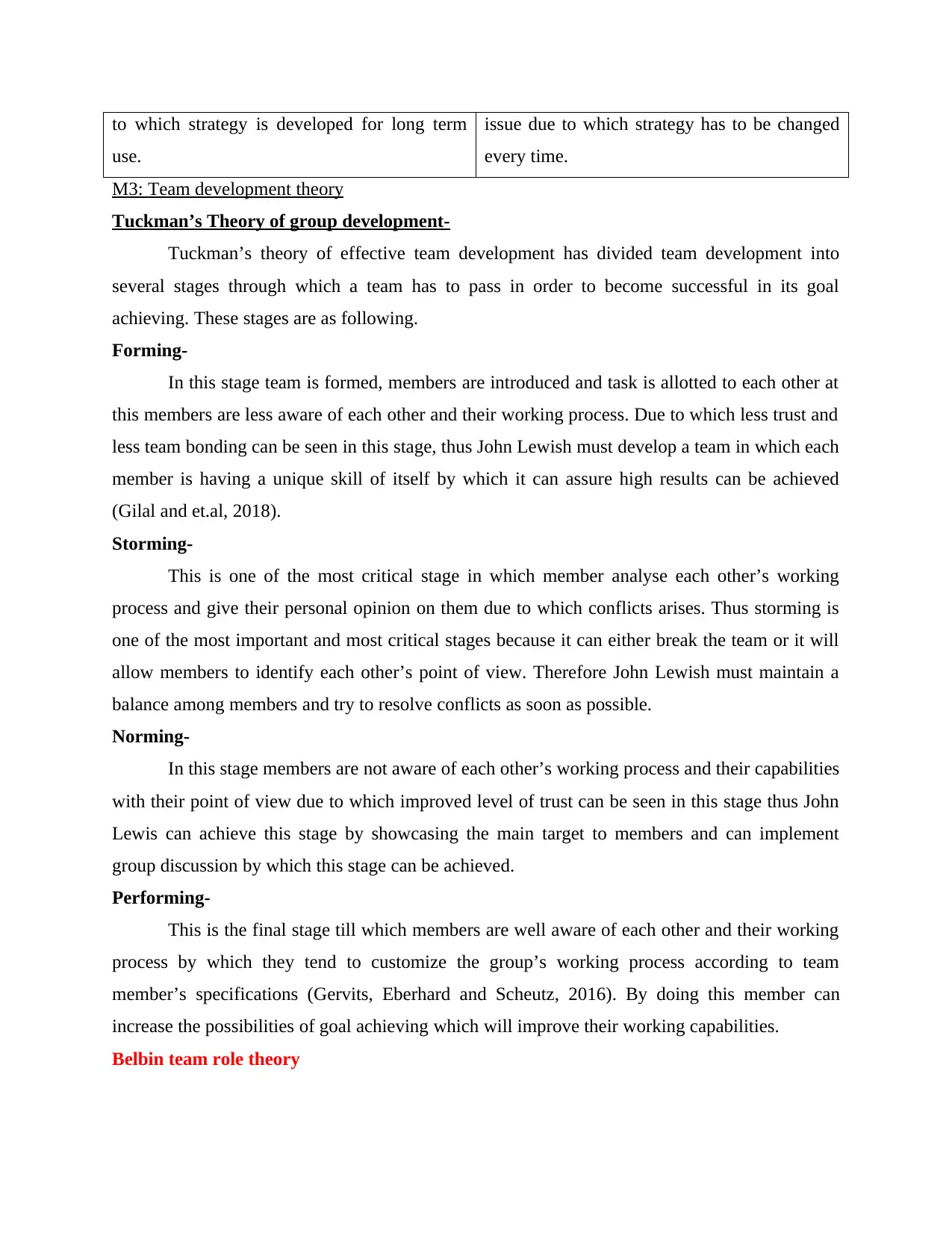
to which strategy is developed for long term
use.
issue due to which strategy has to be changed
every time.
M3: Team development theory
Tuckman’s Theory of group development-
Tuckman’s theory of effective team development has divided team development into
several stages through which a team has to pass in order to become successful in its goal
achieving. These stages are as following.
Forming-
In this stage team is formed, members are introduced and task is allotted to each other at
this members are less aware of each other and their working process. Due to which less trust and
less team bonding can be seen in this stage, thus John Lewish must develop a team in which each
member is having a unique skill of itself by which it can assure high results can be achieved
(Gilal and et.al, 2018).
Storming-
This is one of the most critical stage in which member analyse each other’s working
process and give their personal opinion on them due to which conflicts arises. Thus storming is
one of the most important and most critical stages because it can either break the team or it will
allow members to identify each other’s point of view. Therefore John Lewish must maintain a
balance among members and try to resolve conflicts as soon as possible.
Norming-
In this stage members are not aware of each other’s working process and their capabilities
with their point of view due to which improved level of trust can be seen in this stage thus John
Lewis can achieve this stage by showcasing the main target to members and can implement
group discussion by which this stage can be achieved.
Performing-
This is the final stage till which members are well aware of each other and their working
process by which they tend to customize the group’s working process according to team
member’s specifications (Gervits, Eberhard and Scheutz, 2016). By doing this member can
increase the possibilities of goal achieving which will improve their working capabilities.
Belbin team role theory
use.
issue due to which strategy has to be changed
every time.
M3: Team development theory
Tuckman’s Theory of group development-
Tuckman’s theory of effective team development has divided team development into
several stages through which a team has to pass in order to become successful in its goal
achieving. These stages are as following.
Forming-
In this stage team is formed, members are introduced and task is allotted to each other at
this members are less aware of each other and their working process. Due to which less trust and
less team bonding can be seen in this stage, thus John Lewish must develop a team in which each
member is having a unique skill of itself by which it can assure high results can be achieved
(Gilal and et.al, 2018).
Storming-
This is one of the most critical stage in which member analyse each other’s working
process and give their personal opinion on them due to which conflicts arises. Thus storming is
one of the most important and most critical stages because it can either break the team or it will
allow members to identify each other’s point of view. Therefore John Lewish must maintain a
balance among members and try to resolve conflicts as soon as possible.
Norming-
In this stage members are not aware of each other’s working process and their capabilities
with their point of view due to which improved level of trust can be seen in this stage thus John
Lewis can achieve this stage by showcasing the main target to members and can implement
group discussion by which this stage can be achieved.
Performing-
This is the final stage till which members are well aware of each other and their working
process by which they tend to customize the group’s working process according to team
member’s specifications (Gervits, Eberhard and Scheutz, 2016). By doing this member can
increase the possibilities of goal achieving which will improve their working capabilities.
Belbin team role theory
Paraphrase This Document
Need a fresh take? Get an instant paraphrase of this document with our AI Paraphraser
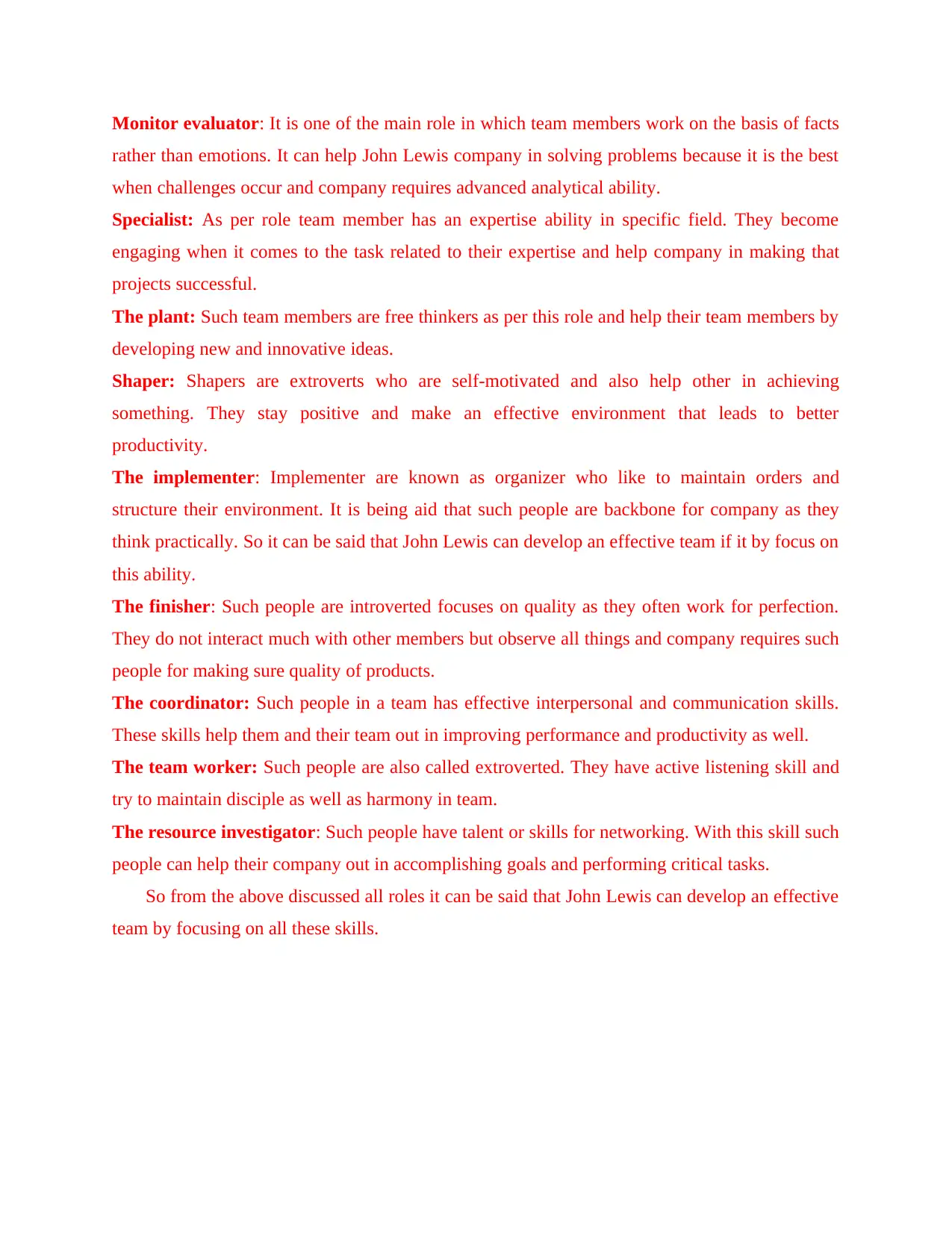
Monitor evaluator: It is one of the main role in which team members work on the basis of facts
rather than emotions. It can help John Lewis company in solving problems because it is the best
when challenges occur and company requires advanced analytical ability.
Specialist: As per role team member has an expertise ability in specific field. They become
engaging when it comes to the task related to their expertise and help company in making that
projects successful.
The plant: Such team members are free thinkers as per this role and help their team members by
developing new and innovative ideas.
Shaper: Shapers are extroverts who are self-motivated and also help other in achieving
something. They stay positive and make an effective environment that leads to better
productivity.
The implementer: Implementer are known as organizer who like to maintain orders and
structure their environment. It is being aid that such people are backbone for company as they
think practically. So it can be said that John Lewis can develop an effective team if it by focus on
this ability.
The finisher: Such people are introverted focuses on quality as they often work for perfection.
They do not interact much with other members but observe all things and company requires such
people for making sure quality of products.
The coordinator: Such people in a team has effective interpersonal and communication skills.
These skills help them and their team out in improving performance and productivity as well.
The team worker: Such people are also called extroverted. They have active listening skill and
try to maintain disciple as well as harmony in team.
The resource investigator: Such people have talent or skills for networking. With this skill such
people can help their company out in accomplishing goals and performing critical tasks.
So from the above discussed all roles it can be said that John Lewis can develop an effective
team by focusing on all these skills.
rather than emotions. It can help John Lewis company in solving problems because it is the best
when challenges occur and company requires advanced analytical ability.
Specialist: As per role team member has an expertise ability in specific field. They become
engaging when it comes to the task related to their expertise and help company in making that
projects successful.
The plant: Such team members are free thinkers as per this role and help their team members by
developing new and innovative ideas.
Shaper: Shapers are extroverts who are self-motivated and also help other in achieving
something. They stay positive and make an effective environment that leads to better
productivity.
The implementer: Implementer are known as organizer who like to maintain orders and
structure their environment. It is being aid that such people are backbone for company as they
think practically. So it can be said that John Lewis can develop an effective team if it by focus on
this ability.
The finisher: Such people are introverted focuses on quality as they often work for perfection.
They do not interact much with other members but observe all things and company requires such
people for making sure quality of products.
The coordinator: Such people in a team has effective interpersonal and communication skills.
These skills help them and their team out in improving performance and productivity as well.
The team worker: Such people are also called extroverted. They have active listening skill and
try to maintain disciple as well as harmony in team.
The resource investigator: Such people have talent or skills for networking. With this skill such
people can help their company out in accomplishing goals and performing critical tasks.
So from the above discussed all roles it can be said that John Lewis can develop an effective
team by focusing on all these skills.
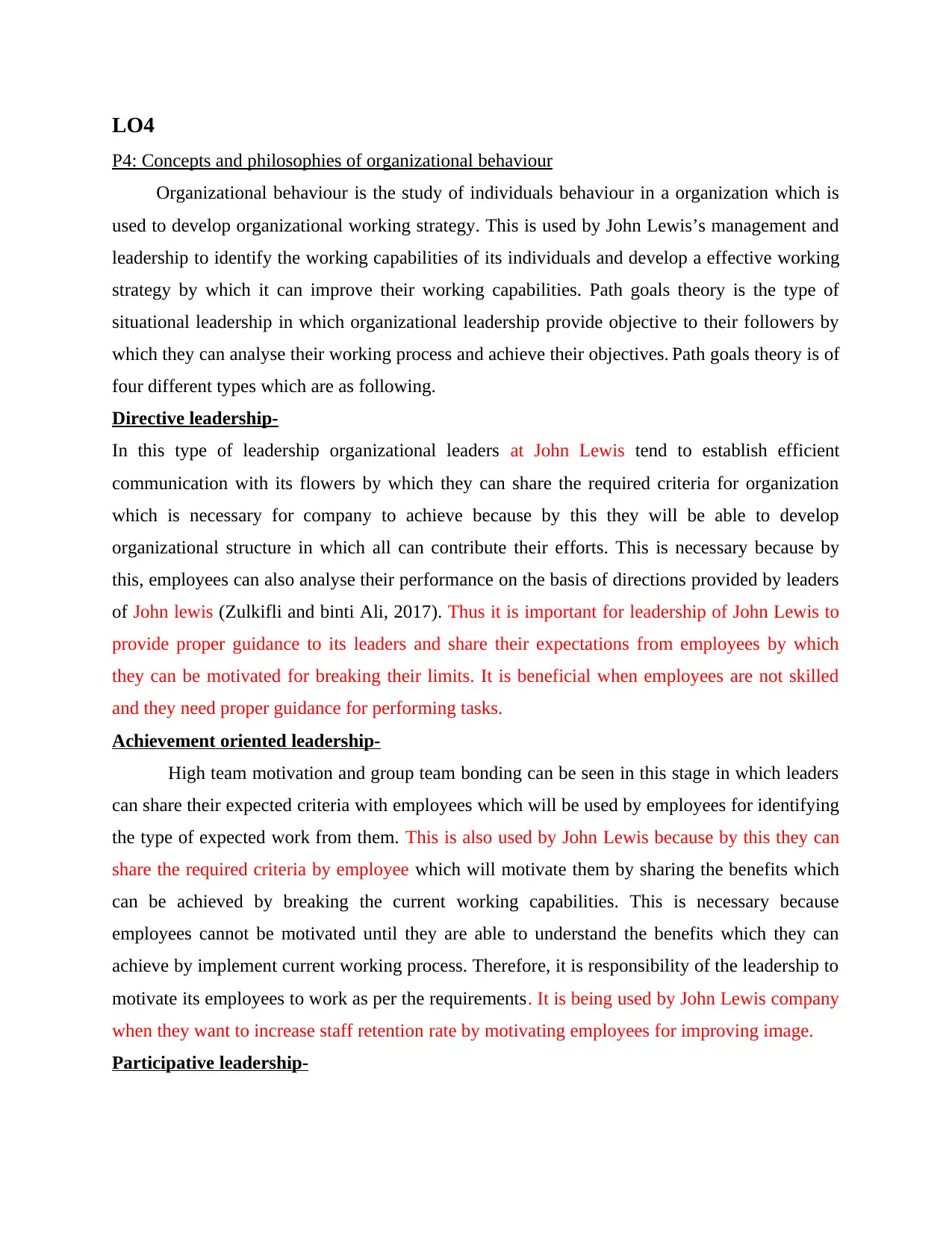
LO4
P4: Concepts and philosophies of organizational behaviour
Organizational behaviour is the study of individuals behaviour in a organization which is
used to develop organizational working strategy. This is used by John Lewis’s management and
leadership to identify the working capabilities of its individuals and develop a effective working
strategy by which it can improve their working capabilities. Path goals theory is the type of
situational leadership in which organizational leadership provide objective to their followers by
which they can analyse their working process and achieve their objectives. Path goals theory is of
four different types which are as following.
Directive leadership-
In this type of leadership organizational leaders at John Lewis tend to establish efficient
communication with its flowers by which they can share the required criteria for organization
which is necessary for company to achieve because by this they will be able to develop
organizational structure in which all can contribute their efforts. This is necessary because by
this, employees can also analyse their performance on the basis of directions provided by leaders
of John lewis (Zulkifli and binti Ali, 2017). Thus it is important for leadership of John Lewis to
provide proper guidance to its leaders and share their expectations from employees by which
they can be motivated for breaking their limits. It is beneficial when employees are not skilled
and they need proper guidance for performing tasks.
Achievement oriented leadership-
High team motivation and group team bonding can be seen in this stage in which leaders
can share their expected criteria with employees which will be used by employees for identifying
the type of expected work from them. This is also used by John Lewis because by this they can
share the required criteria by employee which will motivate them by sharing the benefits which
can be achieved by breaking the current working capabilities. This is necessary because
employees cannot be motivated until they are able to understand the benefits which they can
achieve by implement current working process. Therefore, it is responsibility of the leadership to
motivate its employees to work as per the requirements. It is being used by John Lewis company
when they want to increase staff retention rate by motivating employees for improving image.
Participative leadership-
P4: Concepts and philosophies of organizational behaviour
Organizational behaviour is the study of individuals behaviour in a organization which is
used to develop organizational working strategy. This is used by John Lewis’s management and
leadership to identify the working capabilities of its individuals and develop a effective working
strategy by which it can improve their working capabilities. Path goals theory is the type of
situational leadership in which organizational leadership provide objective to their followers by
which they can analyse their working process and achieve their objectives. Path goals theory is of
four different types which are as following.
Directive leadership-
In this type of leadership organizational leaders at John Lewis tend to establish efficient
communication with its flowers by which they can share the required criteria for organization
which is necessary for company to achieve because by this they will be able to develop
organizational structure in which all can contribute their efforts. This is necessary because by
this, employees can also analyse their performance on the basis of directions provided by leaders
of John lewis (Zulkifli and binti Ali, 2017). Thus it is important for leadership of John Lewis to
provide proper guidance to its leaders and share their expectations from employees by which
they can be motivated for breaking their limits. It is beneficial when employees are not skilled
and they need proper guidance for performing tasks.
Achievement oriented leadership-
High team motivation and group team bonding can be seen in this stage in which leaders
can share their expected criteria with employees which will be used by employees for identifying
the type of expected work from them. This is also used by John Lewis because by this they can
share the required criteria by employee which will motivate them by sharing the benefits which
can be achieved by breaking the current working capabilities. This is necessary because
employees cannot be motivated until they are able to understand the benefits which they can
achieve by implement current working process. Therefore, it is responsibility of the leadership to
motivate its employees to work as per the requirements. It is being used by John Lewis company
when they want to increase staff retention rate by motivating employees for improving image.
Participative leadership-
⊘ This is a preview!⊘
Do you want full access?
Subscribe today to unlock all pages.

Trusted by 1+ million students worldwide
1 out of 15
Related Documents
Your All-in-One AI-Powered Toolkit for Academic Success.
+13062052269
info@desklib.com
Available 24*7 on WhatsApp / Email
![[object Object]](/_next/static/media/star-bottom.7253800d.svg)
Unlock your academic potential
Copyright © 2020–2025 A2Z Services. All Rights Reserved. Developed and managed by ZUCOL.





